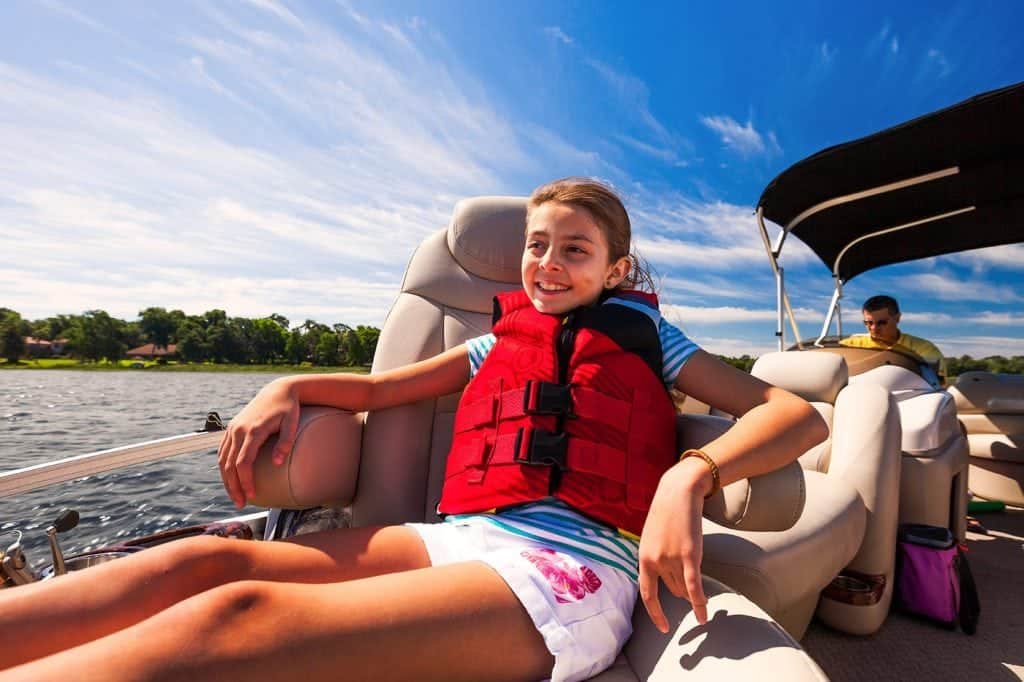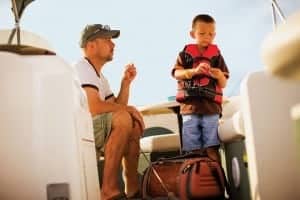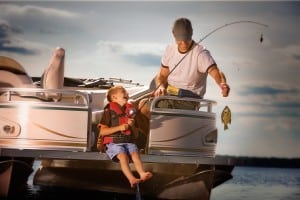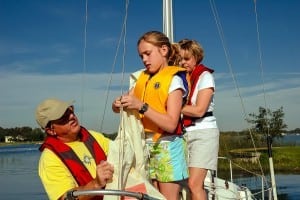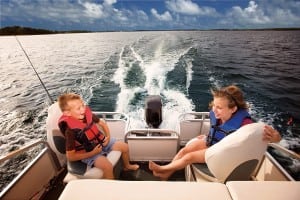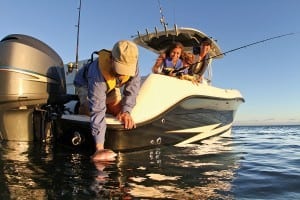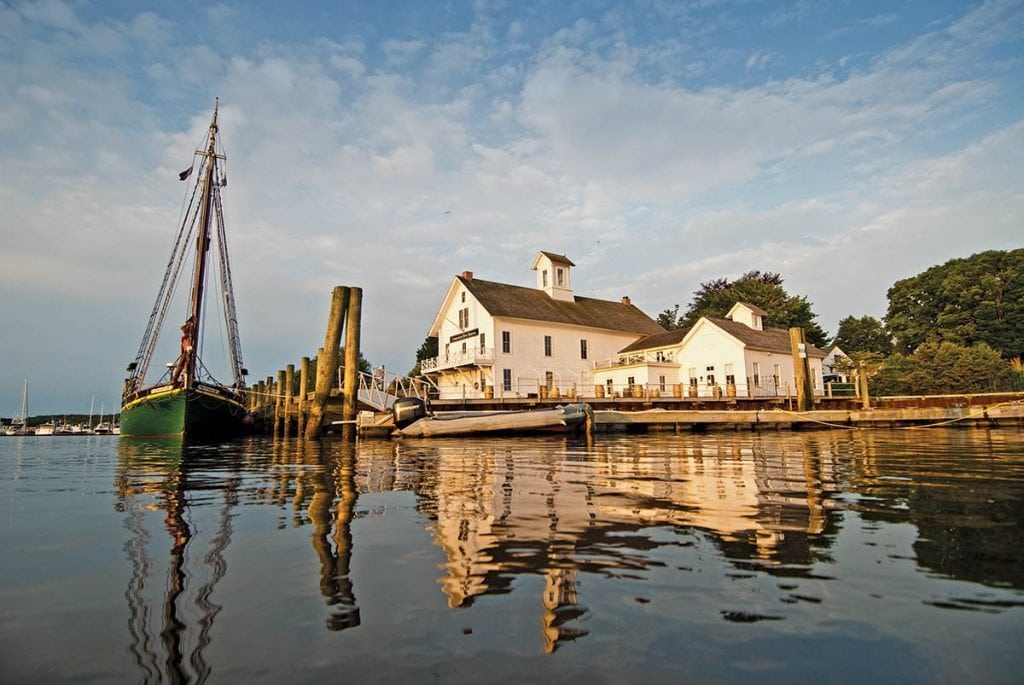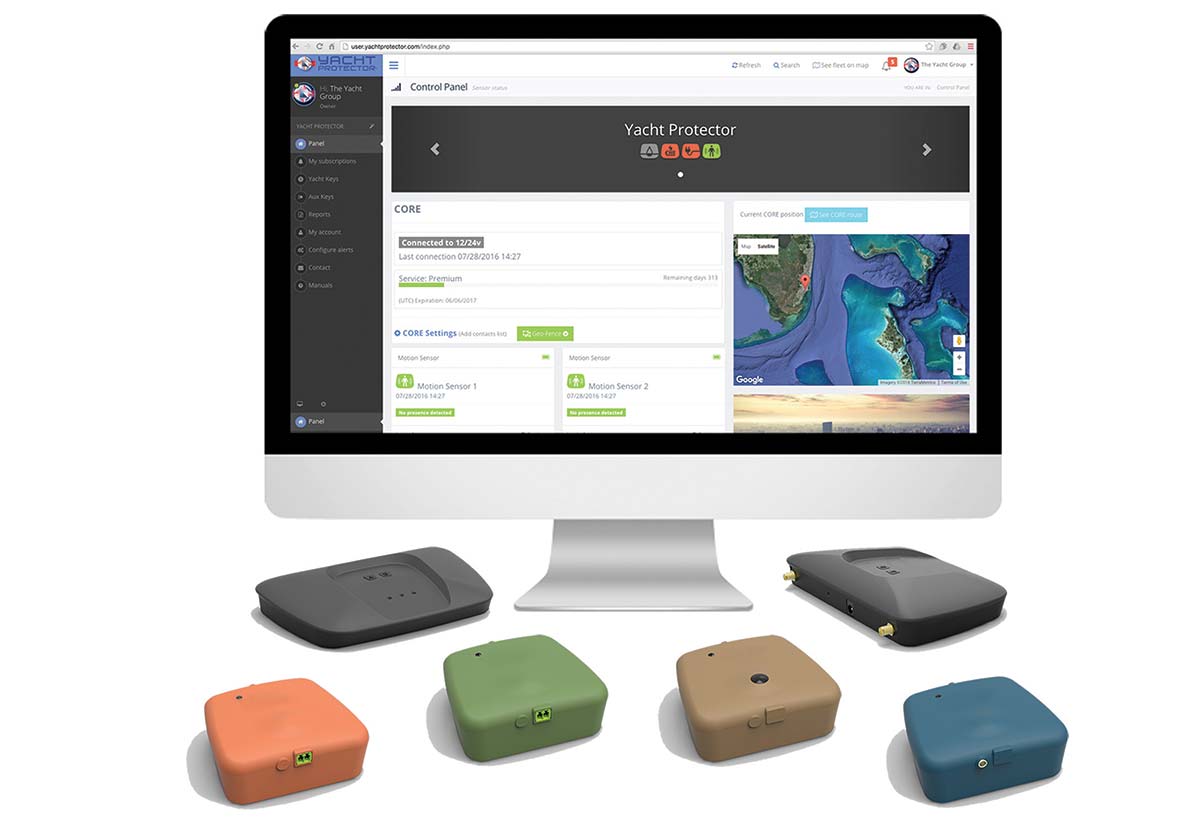Are you teaching your kids how to operate and maintain the boat? Start now with these ideas for every age group.
Kids and boating can go hand in hand.
Kids, especially siblings, squabble. It happens with toys, clothes, you name it. But squabbling over a responsibility?
That’s the reality aboard Glen Ader’s and his wife’s boat. Their boys, ages 11 and 8, are typically happy to tackle different tasks on the 32-foot Grand Banks. But when it comes to handling dock lines, each wants to be the only one to do it. Ader laughs in relating how he and his wife gently remind the boys to take turns: “It’s like, ‘C’mon, dudes, share.’”
The couple may be unusual in some respects—they held part of their wedding ceremony on the back of their then-boat, a Trophy. But they’re no different than hundreds of other parents who are also passionate boat owners. The Aders have been raising their boys to become cruisers since they were in their car seats. Car seats that got carried from the family automobile to the boat, naturally. So, as their sons are growing up, the Aders encourage them to learn more about the responsibilities of operating and owning a boat. They know that kids and boating is the best combination.
Ader is a firm believer that kids are never too young for parents to start this education process. “Kids love to learn, and love to learn with their hands,” he avers. He grew up boating and recalls that by his teens, he took the family boat out more than his dad, a tugboat captain who regularly enjoys the lifestyle to this day.
Ader’s experience as a child and his own children’s ongoing experiences underscore the findings of the 2013 Recreational Boating Statistical Abstract, published by the National Marine Manufacturers Association. It reveals that nearly 8 out of 10 adults who boated that year had also done so as children. Furthermore, the report found that people who enjoyed the lifestyle as children were more likely to do so as adults, too.
If you’re a parent or grandparent and haven’t yet thought about teaching your young ones the ropes (no pun intended), here are some general age-oriented tips to get you started.
Elementary School
Five- to 10-year-olds can learn a variety of things, some of which depend on their dexterity:
• Knot tying. If your kids can tie their shoelaces, they can learn a few simple knots. Imagine your child’s pride when you use his or her handiwork the next time on board.
• Wind and current. No need to go into detailed dissertations on the Beaufort scale or sea states; the Ader boys were each around five or six when they began learning the basics on how wind and current affect a boat.
• Handling dock lines. Let your kids practice when the water is calm and there aren’t a lot of other boats around to get comfortable. “It’s something they can do where there’s not really a lot of risk of them getting injured,” Ader says.
• Simple maintenance. If you do your own maintenance, show your kids what good vs. dirty oil looks like. They can stand by with tools for other tasks and even pitch in while you supervise. Ader says his 8-year-old has likely used a wrench in the bilge more times than his 11-year-old.
• Washdowns. When you’re finished hosing down the boat, hand your child a chamois and turn ‘em loose on rails or brightwork. Consider making a game out of who can dry off the boat the fastest (and safest).
Middle School
All of the above responsibilities can be taught to 11- to 14-year-olds if not done so previously. These additional tasks are appropriate as well:
• Using a boat hook. Practice tossing items into the water for your kids to retrieve using the hook. Depending on your child’s abilities, he or should may even be able to try this at an earlier age.
• Reading helm instruments. By now, your kids can better understand how an autopilot works, what a GPS displays, and more. Consider teaching plotting, too
• Taking the boat out of gear. While none of us wants to dwell on “what if” scenarios, it’s important to be prepared for emergencies. Show your children how to shut things down if for some reason you can’t get to the helm. Consider teaching this if your kids are nearing middle school, too.
Teenagers
• Boat handling. Just as teens can’t wait to get their hands on the car keys, many want to take the wheel of the family boat. Depending on your state’s regulations, your teens may have to be a specific age to handle the helm and have passed a proficiency exam. There’s no minimum age in Florida, for example. However, anyone born on or after January 1, 1988 who wants to operate a vessel with a 10-hp or higher motor in state waters must have a boating education ID card and photo ID. The boating education ID proves he or she has completed a course given by the National Association of State Boating Law Administrators, or an equivalency.
• Emergency drills. Explain what to do in a man-overboard situation, and show your teen how to properly circle back and pick the person up. Even though the Ader boys are still pre-teens, Glen Ader and his wife have already discussed between themselves how they’ll eventually simulate a man-overboard situation by tossing something in the water.
Resources
Admittedly, all of the advice so far is geared toward those of you who are experienced boaters. If you’re a relative newcomer, the Discover Boating initiative, overseen by the National Marine Manufacturers Association, can help. The Discover Boating website includes a new directory of youth boating programs. More than 3,000 local and national programs are listed so far.
Many of these offer first-timers lessons on how to handle a boat, sometimes aboard boats in the program’s fleet or ones chartered for the purpose. Enter your zip code, select the type of activity your kids are interested in (powerboating, sailing, etc.), and the radius you’re willing to travel (10 to 100 miles). Most programs include details on age requirements.
Furthermore, kids as young as four years old can be enrolled in the U.S. Coast Guard Auxiliary’s Boating Fun class. Among other things, the hour-long program provides them with an activity and coloring book that further teaches safe-boating lessons.
Whatever your kids’ ages , and no matter your experience level, it’s vital to put kids and boating together. “The phenomenon, I think, that’s going on now with the younger generations is the need to disconnect and spend more time together,” says Frank Peterson, president and CEO of the Recreational Boating & Fishing Foundation. That’s a nonprofit organization focused on increasing participation in fishing, boating, and aquatic stewardship.
“We call it ‘togethering,’ and I think fishing and boating allow people to spend more of that ‘together time.’ Our sports really appeal to the younger generations. What we have to do is break down some perceived barriers to entry that they may have.”
hookthefuture.com
discoverboating.com
takemefishing.org
By Diane Byrne, Southern Boating Magazine June 2015


